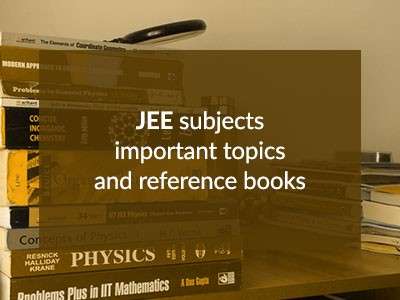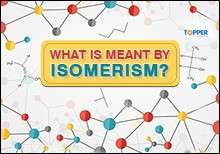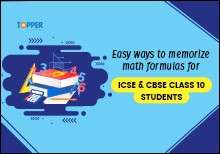JEE Main & Advanced Book Reference and Important Topics for Physics, Chemistry & Maths

JEE important topics and reference books
By 21st Jul, 2017 | 05:36 pm
ShareJEE important topics and reference books for Physics
A good knowledge of the subject and chapter wise weightage is crucial to an excellent JEE rank. You might spend months studying hard 24x7 but end up achieving only an average score. The key to a successful score is studying smart, not hard. Let’s look at the important topics and reference books for Physics.
| Reference Books for Physics | |
| Topic | Author/Publication |
| Concepts of Physics (Part I) | HC Verma |
| Concepts of Physics (Part II) | HC Verma |
| IIT JEE Physics | DC Pandey |
| Problems in General Physics | I.E. Irodov |
| Physics for IIT-JEE | Resnick, Halliday, Walker |
| Problems in Physics | S.S. Krotov |
| Fundamentals of Physics | Halliday, Resnick and Walker |
| University Physics | Freedman and Young |
| Aptitude Test Problems in Physics | Krotov |
| Advance Physics | Nelkon and Parke |
| Objective questions on physics | D.C. Pandey - Arihant Publications |
| Feynman Lectures on Physics | R. P. Feynman |
| A collection of questions and Problems in Physics | L. A. Sena |
Priority-wise sequence of the important topics in Physics
Mechanics
Most of the questions in JEE are from Mechanics and this makes it the most important topic for an engineer. If you have considerable skill in mechanics, it will help you solve questions.The fundamental laws – Newton’s Laws of Motion, Universal Law of Gravitation, the Law of Conservation of Linear Momentum, etc., form the framework of physics. JEE aspirants are expected to know them properly apply these laws to a wide variety of situations.
Any JEE level mechanics problem can be solved by a combination of one or more of these:
• Newton’s laws
• Work energy theorem
• Law of conservation of energy
• Law of conservation of momentum (linear/angular)
• Equation of continuity
• Bernoulli’s theorem
Electricity and magnetism
Quite a few questions can come from applications of Coulomb’s law and Capacitance, Kirchhoff’s laws, Series Parallel Reduction, etc. Although there are a lot of standard formulae in Electrostatics and Magnetostatics, you need to remember them (with directions involved). This will help you on your JEE exam day as you won’t have enough time to derive standard results. Practise from Motional EMF as it is also one of the most asked topics and should be among the top priority chapters for JEE.
Thermal physics
You can expect a mix of calorimetry with the laws of thermodynamics as this chapter covers a big chunk of the paper. Work on the calculations of work, internal energy and heat in various processes.
Fluids and waves and sound
Practice ample questions from Fluid Mechanics, Waves and Sound, and Doppler Effect.
Potentiometer-related experiments
Your JEE paper will have questions on error analysis concerning potentiometer-related experiments.
Optics
One of the easiest topics for JEE is Optics and you need to practise many questions including the topic Huygen’s principles.
Modern physics
Focus on the nuances of Bohr’s model and memorise the common formulae.
JEE important topics and reference books for Chemistry
| Reference Books for Chemistry | |
| Topic | Author/Publication |
| Organic Chemistry | Morrison Boyd |
| Organic Chemistry | O.P Tandon, Solomons |
| Modern Approach to Chemical Calculations | R.C. Mukherjee |
| Numerical Chemistry | P. Bahadur |
| Concise Inorganic Chemistry | J.D. Lee |
| University Chemistry | Freedman and Young for Physical Chemistry |
| Organic Chemistry Volume 1 | I. L. Finar |
| Concept of Organic Chemistry | M. S. Chauhan |
| Chemistry XI & XII | NCERT |
| Inorganic Chemistry | O.P. Tandon & J.D. Lee |
Priority-wise sequence of the important topics in Chemistry
Read, revise, repeat is the formula for mastering the Chemistry section of your JEE. Unlike Physics, marks are equally distributed over the three streams of chemistry. So. Be sure that you don’t skip any topic. Let us look at some of the important topics.
Physical Chemistry
Mole Concept:
It is important to understand the application of mole concept to various types of reactions, especially redox reactions. Several questions of physical chemistry in JEE Main and JEE Advanced can be solved easily if one is well-read on the mole concept.
Atomic Structure
Questions from Atomic Structure are regularly asked in JEE.
Other topics
Questions on concepts like Chemical Thermodynamics, Chemical Equilibrium, Chemical Kinetics, Electrochemistry, etc. have to be revised as they all have nearly equal weightage and are guaranteed to come in the exam.
Organic Chemistry
General Organic Chemistry
Be thorough with the general organic chemistry section – electrophiles, nucleophiles, types of reaction, acidity, basicity, etc. The remaining organic chemistry is just the application part.
Named Reactions
Being familiar with the mechanism of a specific reaction is an advantage as a large part of organic chemistry consists of standard “named” reactions. You should know these reactions along with the mechanisms. Solomon and Fryhle’s Organic Chemistry is one of the best book for learning organic chemistry.
Organic Synthesis
A lot of problems of organic chemistry in your JEE are from organic synthesis. You have to identify the missing reagents/chemicals in a specific step of the synthesis. Hence, it is important to be aware of the common reactions. The portion of organic synthesis, which involves writing a sequence of steps to synthesize a given compound from a given set of reagents with as little effort as possible is also an important part.
Inorganic Chemistry
All chapters in this section are important. Stick to the syllabus as there are many of compounds you need to be well-versed in with respect to their methods of preparation, chemical reactions, uses, etc. Don’t just rot learn the section p-block elements as many questions are asked from this section. You will be able to understand reactions if you have a good grasp of periodic table and the trends in the properties of atoms (ionization potential, atomic radius, electronegativity, electron affinity, the electrode potential).
JEE important topics and reference books for Mathematics
| Reference Books for Mathematics | |
| Topic | Author/Publication |
| Higher Algebra | Hall and Knight |
| Coordinate Geometry | S.L. Loney |
| Differential and Integral Calculus | N. Piskunov/ A Das Gupta |
| Calculus and Analytic Geometry | Thomas and Finney |
| IIT Mathematics | M.L. Khanna |
| Course in Mathematics for IIT-JEE | Tata McGraw Hill publications |
| Problems Plus in IIT Mathematics | A Das Gupta |
| Trigonometry | S L Loney |
| Class XI & XII Mathematics | R.D. Sharma |
| Problems in Calculus of One Variable | I.A. Maron |
| Integral Calculus | Arihant Publication |
| New Pattern Mathematics for JEE Main/Advanced | Arihant Publication |
Priority-wise sequence of the important topics in Mathematics
Practice, Speed, and Accuracy are your weapons for scoring full in the Math section of JEE. The mathematics syllabus for JEE broadly consists of the following topics:
- Trigonometry
- Algebra
- Differential Calculus
- Integral Calculus
- Co-ordinate Geometry
- Vectors
Although the priority of differential and integral calculus is undoubtedly the highest among any other chapter, calculus needs to be done after trigonometry and algebra.
Calculus
Chapters on functions, limits, continuity, differentiability, differentiation, application of derivatives, integration, definite integrals and differential equations are important. The calculus section covers around a third of the paper. You need to know every standard formula and technique used in calculus.
Co-ordinate Geometry
You should be familiar with this topic as it is usually taught in high school. The basic concepts of the slope, equation of a line, etc should be well-known to you. If you solve problems both subjective and objective, from this section, you have a good score in your hands.
Vectors (and 3D Geometry)
Coming to this section after a good practice of coordinate geometry will make 3D geometry portion relatively easy as JEE contains numerous problems pertaining to vectors that require standard formulae as in the case of a parallelopiped, etc.
Algebra
The only solution to solving this section, especially the questions on permutations and combinations and complex numbers is practice. Tip: If you can correlate question from complex numbers to a coordinate geometry problem, you have won the war.
Trigonometry
Important Resources
- Education Franchisee opportunity
- NCERT Solution
- CBSE Class 9 Mathematics
- NCERT Solutions for class 10 Science
- Sample Papers
- CBSE Class 9 Science
- NCERT Solutions for class 10 Maths
- Revision Notes
- CBSE Class 10 Hindi
- CBSE Class 10 English
- CBSE Class 10 English
- CBSE Class 10 Social Studies
- CBSE Class 10 Science
- CBSE Class 10 Mathematics
- Career In Science After 10
- Career In Commerce After 10
- Career In Humanities/Arts After 10
- NCERT Solutions for Class 10
- NCERT Solutions for Class 11
- Business Studies Class 12 CBSE project





